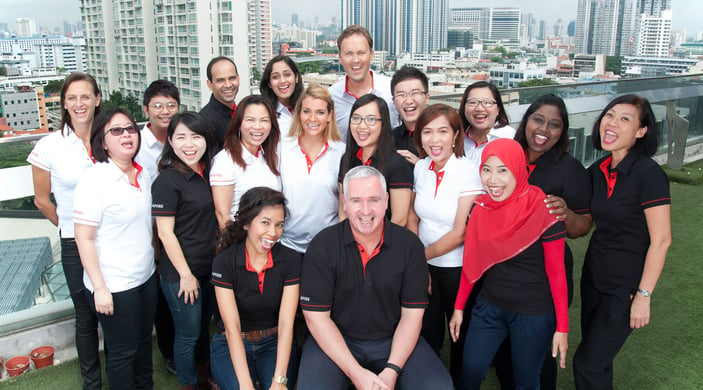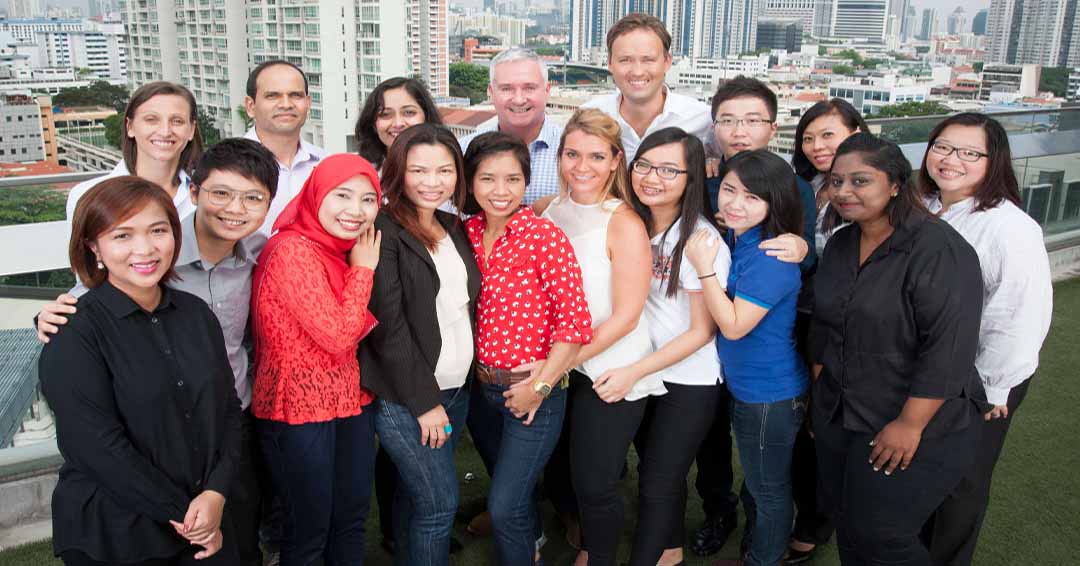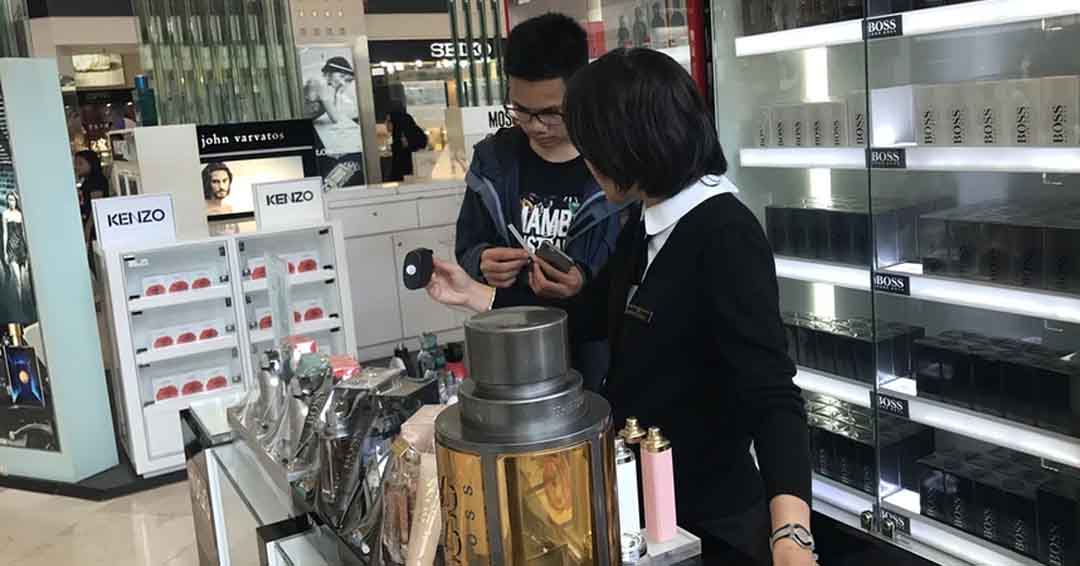
Our latest CPM Expert Speak comes from Martin Ryan; Chief Development Officer at CPM Group of Companies Asia Pacific. Martin has worked for CPM for sixteen years and has over twenty-five years industry experience.
Expanding your horizons
Martin discusses the positive aspects of an overseas assignment and comments on the cultural and personal behaviours and strategies to demonstrate when conducting business in Asia.

Hands up all of those who have dreamt of expanding their horizons to experience life and business in a very different part of the globe to the one they were born in? In an ever-shrinking world, an overseas placement is now less of a dream and more of a mandatory move, especially if your ambition is to forge a senior role in the modern global landscape. Forcing yourself out of your comfort zone and into a culturally unfamiliar environment gives you the opportunity to blend information and communication styles and elevate your understanding of people and yourself. People buy from people and building your experience of diversity will undoubtedly contribute to your success as we continue to demonstrate diversity and inclusivity.
Building your experience of diversity
As the Asian arm of the CPM business started to develop at a fast pace I was fortunate enough to be transferred to the region. I duly began my Asian journey in 2013 as interim CEO for China based in Shanghai. In 2014, I became Chief Development Officer at CPM Group of Companies Asia Pacific, with a brief to accelerate and coordinate business and help execute regional sales and marketing activity across Asia for clients such as Apple, Agilent, HP and P&G. Based in Singapore with offices and partners in India, Indonesia, Malaysia, Vietnam, Thailand, Hong Kong and Australia, my role requires me to travel extensively throughout the ASEAN region.
Relishing the opportunity to immerse myself, the first lesson I had to learn in Asia was patience. Anyone in sales instinctively knows that success lies in building meaningful relationships based on trust and honesty, which are robust enough to thrive in the good times and endure when the road is rocky. Business in Asia is no different, but you have to build relationships patiently over time. Generally, Asian culture is reserved and formal when it comes to business. Time is needed to establish credibility and to navigate the nuances of respect and hierarchy. It is also prudent to carefully research whom you are considering partnering with. There is a marked reluctance to say ‘no’ in Asian business culture so it can appear on the surface that everyone is able to cater to your every business need. Hard experience may prove that this is not necessarily the case.
Building meaningful relationships patiently
Meetings in Asia tend to be formal and can also be fraught with opportunities to cause unintended offence as I have all too frequently discovered! Be especially careful with introductions. There is an established etiquette when you exchange business cards. Your business card is integral to identity and represents your “face” in the world, so when you receive a card, treat it with respect, read it carefully and never put it in your back pocket as this is perceived as being very rude. Always have a supply of business cards with you as they are also exchanged on social occasions.
Be cautious with physical contact. A big hearty handshake is out as is a playful slap on the back. Although many Asian cultures have large urban populations making it necessary to stand very close together in queues or on public transport, they tend to stand farther apart than many other cultures when engaged in business. A light handshake and slight bow is sufficient and only shake hands with an Asian woman if she offers her hand first. Also, age and seniority are important. Always greet the most senior person first and wait to be offered a seat if you are in a client’s office. Never point and don’t stand with your hands in your pockets. Don’t ask direct questions such as ‘How’s business?’ This may cause the other party some discomfort which is to be avoided at all costs.
Vital to establishing a genuine partnership is physically going out and meeting people. Networking is important in any culture, but it is crucial in Asia. You need to get out from behind the computer screen, attend events and be seen. Socially, eating is central to all Asian cultures. Food is not something to be mindlessly consumed at your desk. I eat with my teams and treat food with respect. A common greeting is “Have you eaten?” which is similar to saying “How are you?” A formal lunch hour is observed and people actually leave their desks to go out to eat. If you organise a team get together or a long meeting, make sure there is enough food and refreshments. You risk being a social and business pariah if you neglect this. Note that sufficient food at company events is always more important than copious amounts of alcohol! Don’t eat or drink before your host and always leave a little food in your bowl.
Something I was not expecting is how difficult it can be to move a negotiation forward. Small details can become major sticking points and information can be difficult to extract.
Again, patience and understanding are required as you build up enough trust to get beneath the surface. Business is conducted on a hieratical basis so be careful if you go above an individual’s head as this upsets the status quo. Also, when posing a solution, resist the temptation to automatically use people as a quick fix, as labour costs are cheaper, and persevere to introduce business efficiencies.
When building sales teams, especially in Singapore, be sensitive to the diversity of faith and ethnicity. The majority of people are devout in their religious practices so be respectful. Also never underestimate the importance of family, in Asia, family always comes first and will trump everything else. Teams are naturally more collective than individual and it is considered very bad form to raise your voice or single an individual out for criticism. The concept of ‘face’ is an important one. In the Asian business culture, any act which is deemed to have caused an individual to “lose face” (be embarrassed in front of others) will devastate your reputation. The fear of losing face also means that others do not like to criticise you in person. I recently had a face-to-face meeting with a client in China where no issues were raised. Upon returning to the office, I received an email from the same client detailing many areas where the client was not happy and felt our business was underperforming.
It is important that you check that everyone understands deadlines, targets and what is expected. Sending an email directive and assuming everyone is on track is not enough. People may say they understand to avoid losing face, but when you probe further, there may be issues preventing delivery and you have to spend time teasing them out. This is a delicate procedure and one where patience and perseverance are called upon.
Also, expect to be under pretty intense personal scrutiny. My rather florid Irish colouring is sometimes met with “You so red, lah!” It is also not unusual to be asked personal questions for instance, “How old are you?” “How much rent do you pay?” Have a few strategies in hand to deflect the comments without being rude.
Watch your language, especially if you like to chat, which I do! Keep sentences short and to the point and avoid colloquialisms. I once asked if some costs were “in the ballpark” and were met by a quizzical look. Another thing to be aware of, especially on conference calls, is you may be met by periods of silence. Asian sentence structure often puts the verb at the end so it can take a little time for translation. Resist the temptation to butt in and instead give people time to respond. Be aware that not everybody will understand your accent so slow things down a little without raising your voice too loudly.
Delve below the surface
In summary, conducting business in Asia is a phenomenal opportunity and one which will enrich your life and the life of your family in many ways. Yes, you have to adapt and will experience moments of bewilderment and dislocation but overall you will learn a great deal about the world and have more to offer when you return to your home country. Asia is a culturally diverse, noisy and colourful experience, at the forefront of innovation and technical development. It is worth persevering and delving below the surface to build real robust business relationships which will be mutually beneficial for the long term.
Ten things to remember when conducting business in Asia
1. Be patient. An agreement can take time and many meetings. You have to build up credibility through face-to-face contact.
2. Food is important. Embrace local cuisine and eat with your team.
3. Ceremony is important, especially in meetings.
4. Learn to tone down the volume and demonstrativeness of your delivery. Don’t overwhelm people.
5. Embrace local customs. It certainly pays to learn as much as possible about the local culture before embarking on any meetings.
6. Learn to respect silence and not rush to fill it.
7. Do not shout or criticise anyone in public. Learn the importance of ‘face.’
8. Never underestimate the importance of family. Family always comes first in Asia.
9. Don’t be sensitive to direct comments.
10. Never forget you are being watched so conduct yourself with restraint.


 2 minute read
2 minute read


